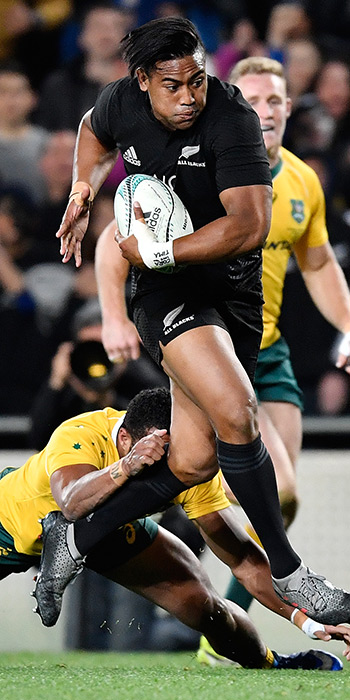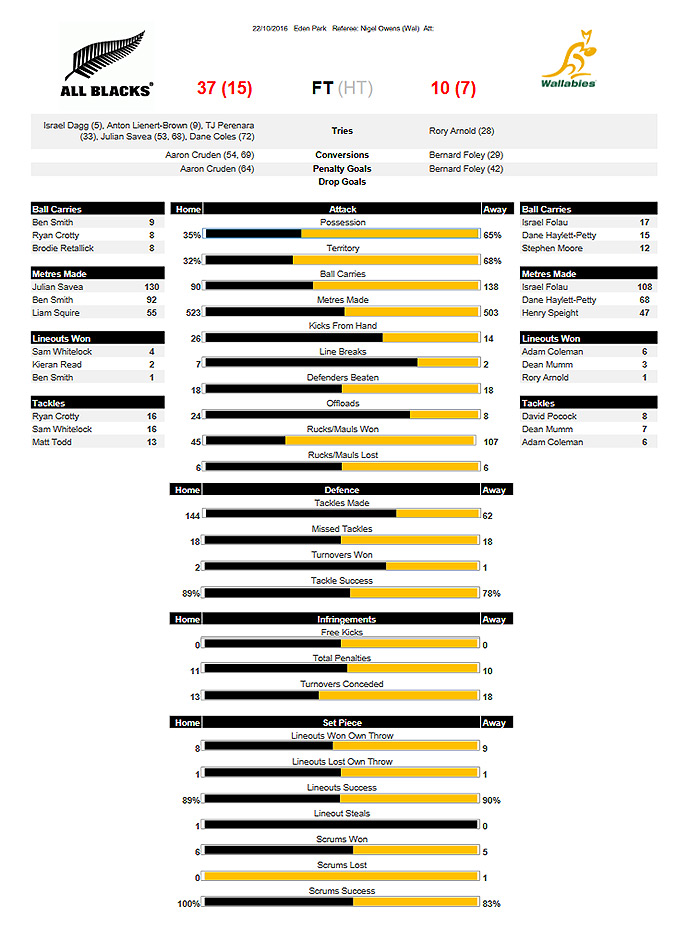Wallabies so close, yet so, so far away
Oh for a bit of common sense in rugby officiating.
The TMO decision to overrule Nigel Owens' on-field decision to award a try to Wallabies wing Henry Speight in the final Bledisloe Cup Test of 2016 was lacking one significant element that was never going to show up on a replay.
Even if the ruling was technically correct that Dane Haylett-Petty changed his line to stay in front of All Black wing Julian Savea – as both players trailed Speight – how Shaun Veldsman came to the conclusion that Savea was in any position to tackle Speight is something I'll never comprehend.
It completely lacked all common sense.
And that's not to say that the Wallabies lost the Test on that decision; of course it's not.
It's entirely likely that New Zealand would still have run away with the game with their superior fitness and belief in the last 20 minutes because, well … that's just what they do.
But the impact of that decision to overrule cannot be understated. At 15-all with the kick to come, and even with the conversion being in the worst part of the ground for Bernard Foley as a kicker, the confidence boost that try would've given the Wallabies would have been significant with around 35 minutes to play.
As it was, the All Blacks very nearly scored themselves through Dane Coles only a minute or two later, and then did score through Savea in the 54th minute.
At 22-10, the game was lost as quickly and as simply as that.
Yet strangely, that was one of the Wallabies' best performances of 2016.
That's probably what makes the loss all the harder to take for Wallabies fans. One of the better Eden Park performances in recent memory turned in one infuriating moment.
Bernard Foley, reinstated in his preferred No.10 jersey, was much more effective than he had been at inside centre during the Rugby Championship, and the presence of ball carriers all around him meant that he too played a lot flatter, ran a lot straighter, and actually looked dangerous going to the line.
The Reece Hodge-Samu Kerevi centre pairing didn't see much beyond the mid-point of the first half, but they did ask plenty of questions of the New Zealand midfield defence in that time. Even Israel Folau was looking to involve himself more in the action, which is something Wallabies fans have been begging of him for the past month or two.
But a lot of the same old problems remained, too.
The Wallabies' last pass options, especially in the first 25 or so minutes was regularly questionable, and far too often resulted in a soft turnover.
The Wallabies' back row in that same timeframe looked like they were positively allergic to hitting an attacking breakdown, which in turn often resulted in only marginally less-softer turnovers.
The error rate and decision making in that first quarter of the game looked the Wallabies were trying to get beaten by 50.
Yet they were only down by eight points at half-time, and were even having a few little wins in the forwards. The scrum was forcing the All Blacks props to take risks, and the line-out – which had been a huge problem during the Rugby Championship – was even holding its own.
With all that considered, it's almost a bit unfair that the scoreboard shows a 27-point margin, because it's arguable that the Wallabies were anywhere near that bad.
And that's the bitterest of bitter pills to swallow. Even when an Eden Park win looks within arm's reach, it so quickly disappears and is as far away as ever.
Perth Spirit take out maiden National Rugby Championship title
Coming at a time when certain elements of Australian rugby would rather the competition didn't exist, and with the Super Rugby future of the Western Force very much in the balance, the timing of Perth Spirit taking out the NRC couldn't have been much better.
Perth won through to the Final on the back of a dominant set piece and breakdown performance in the semifinal against the highly-fancied Sydney Rays, and then just repeated that formula in the Final against NSW Country.
The 20-16 win was all about rolling the sleeves up and toughing it out for a result, and the Spirit's second half defence as Country threatened to come back at them was nothing short of astonishing. This was proper knockout rugby stuff.
The Spirit's title is also a nice reminder that rugby in Australia doesn't just exist outside Sydney and Brisbane, it's actually flourishing. To ignore that doesn't just seem ridiculously short-sighted, it's actively ignoring the growth of the game's national footprint.
By Brett McKay
@BMcSport
@rugby365com
* Brett McKay is an Australian rugby writer and commentator, who has sat through more Bledisloe Cup and World Cup Final losses than any human should have to endure, and is desperately hoping for a change of luck soon. For regular musings on rugby, sport, and all manner of life's trivialities, you'll find Brett on Twitter at @BMcSport






































